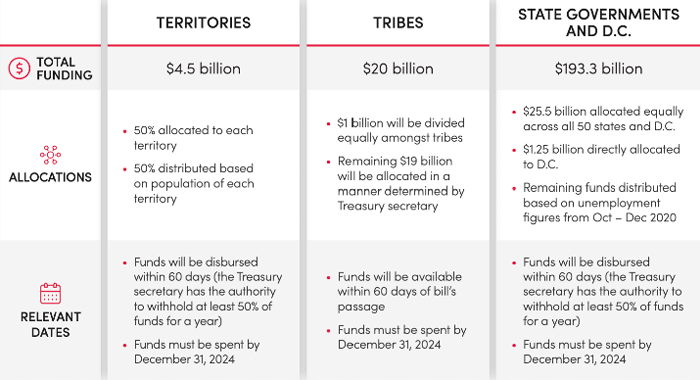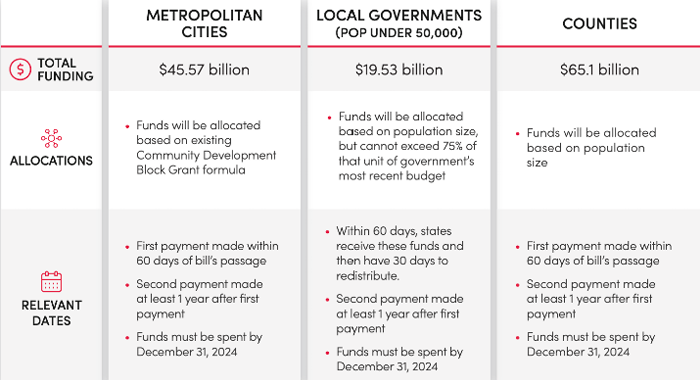American Rescue Plan Funding and Short-Term Rentals: Connecting the Dots
If you’ve been looking for funding and technology to help you solve short-term rental (STR) challenges and generate new revenue at the same time, you’ve come to the right place. The new American Rescue Plan, signed into law on March 11, 2021, includes $350 billion of aid that was allocated to state and local governments, the bulk of which comes in the form of Coronavirus State and Local Fiscal Recovery Funds. These funds can be used to address the negative economic impact state and local governments have experienced due to the pandemic, which includes the tourism and travel industries.
Understanding the Broader Short-Term Rental Market | A Quick Overview
- The STR industry is a booming, multi-billion-dollar-industry with more than 1.8 million listings in the U.S. alone.
- Many jurisdictions are missing out on a steady stream of lodging revenue that could be earned through proactive tax collection.
- Even if you have an ordinance in place, only about 10% of STR owners voluntarily register and comply with regulations. STR enforcement is a critical aspect of overall success.
- COVID-19 has negatively affected the local and state governments’ revenue, resulting in billions of dollars’ worth of loss.
More than ever before, compliance to STR regulations is a huge opportunity for governments. Enforcement—which focuses on those who are generating income rather than trying to raise taxes, fines, and fees for all—is truly a necessary component of a thoughtful STR program. With the right partner, a few initiatives can be easy to implement, but offer a huge return on investment while also preserving community character, increasing the quality-of-life for residents, and the revenue needed to fund vital services. The City of Nashville, for example, generated an additional $2.8 million in STR-related tax revenue in its first year; part of which was devoted to creating more affordable housing in the city.
Available Funding for the American Rescue Plan
At $1.9 trillion, the American Rescue Plan is a massive, multi-component, stimulus bill that more than doubles the funds provided by the CARES Act, which was signed into law last winter. This one is particularly important to state and local governments because it allocates more than $350 billion to these entities specifically and includes new or existing projects, unlike its predecessor. Let’s look at each entity separately.
State Fiscal Recovery Funds | $219.8 billion
$219.8 billion is being allocated from the United States Treasury to territories, tribes, and state governments (and Washington D.C.). The breakdown varies depending on the entity.

Coronavirus State Recovery Funds ($219.8 billion)
Eligible expenses include funds used to “respond to the public health emergency or its negative economic impacts, including assistance to households, small businesses, and nonprofits, or aid to impacted industries such as tourism, travel, and hospitality,” which is where the STR industry clearly comes into play. Your job will be to make the case for how your STR compliance project will have a positive impact on tourism in your area. Keep in mind: Even though recipients have until December 2024 to spend these funds, most state and local governments are likely to determine how these funds will be spent much, much earlier. So, start advocating for your projects sooner rather than later.
Local Fiscal Recovery Funds | $130.2 billion
$130.2 billion is being allocated from the United States Treasury to metropolitan cities, populations of less than 50,000, and counties, each getting their own share.

Coronavirus Local Fiscal Recovery Funds ($130.2 billion)
Just like the state fiscal recovery funds, eligible expenses include funds used to “respond to the public health emergency or its negative economic impacts, including assistance to households, small businesses, and nonprofits, or aid to impacted industries such as tourism, travel, and hospitality,” which is—again—well suited for the STR industry. Your job will be to connect the dots between the pandemic’s negative impact on tourism and how your STR compliance project will positively impact tourism in your area.
Connect the Dots in Five Simple Steps
Step 1. Because these funds were designed to provide relief for impacted industries—like tourism—it’s much easier to make a case for STR compliance projects, especially if you can specify concrete details about how the tourism market (in your area) has suffered because of the pandemic and how a new or revitalized STR compliance program can directly improve those areas. Issues related to public health safety and tax revenue would be particularly relevant.
For example, STR compliance projects can create a more even playing field between short-term rentals and traditional lodging providers as it relates to permitting and taxation. This could include ordinance creation advising services, as well as compliance software to ensure short-term rentals are following regulations. This not only ensures fairer competition, but also ensures the fair application of tax law for parties providing similar services.
Step 2. Think about who you will need to speak with (at the state and local level) about accessing these funds. The United States Treasury will most likely distribute funds to state and local governments. Those entities are expected to develop their own internal distribution processes. If you worked with the Coronavirus Relief Fund, for example—or know who did—the same people will probably be involved in funding matters for the American Rescue Plan as well. For states, funding will likely go to the governor’s office, the state legislature, or an agency like the state comptroller. For local governments, the funds will likely be controlled by a finance team or grants manager. Whether you’re at the state or local level, ask around to determine which office will receive funding and who, at that office, will be charged with managing those funds.
Step 3. Look for indicators for how your state or local government will prioritize the funding. Specific types of projects and plan developments may already be underway. Get tapped-in early to gain an understanding of what issues will be prioritized. To help you determine who to talk to and begin to frame your STR strategy, ask yourself the following questions:
- Who is the financial director or person who might have their finger on the pulse of this funding?
- What other city or county departments might need to be looped in to develop an STR strategy?
- Why should Fiscal Recovery Funds grant money be targeted toward STRs?
- How much money is needed?
- When is it needed?
Step 4. A massive increase in tourism is expected after a year of sheltering-in-place, especially as more people get vaccinated and summer approaches. Frame your STR initiative around how to prepare for an influx in tourism. Highlight ways an STR compliance strategy can:
Make sure proper health guidelines are followed. While still on the heels of a global health crisis, it’s never been more important to firmly abide by recommended living and safety standards. A STR ordinance can help with that. By regulating STR activities and requiring an inspection from a certified safety inspector, your government can help to ensure that STR hosts meet all the necessary safety standards. Compliance with state and federal regulations should be established by the issue of a warranty of habitability.
Communicate quickly and easily with STR owners. To prepare for a busier than usual tourist season, STR owners must be easily accessible to ensure that everyone plays by the rules. STR hosts need to be educated operators, units must be monitored for compliance, and cases of suspected non-compliance have to be investigated and reprimanded swiftly. Without automation and streamlined processes, this would be an impossible feat. Software like Granicus Host Compliance was designed to streamline personalized communication with STR property owners. Instead of having to painstakingly stuff envelopes, Host Compliance can automatically send communications to property owners to make them aware of their property’s status, including any non-compliant issues. The communications include screenshots (if necessary) and step-to-step instructions on how to become compliant.
Recoup missing tax revenue. An influx in tourism could also mean an influx in tax revenue. In 2020, 25% of total lodging revenue came from STRs, a huge jump in STR revenue share when compared to the total lodging market. If your city, county, or state depends on lodging revenue (such as a bed, transient, occupancy, or lodging tax) to fund your programs and you don’t have a way to effectively collect taxes in this market, you’re potentially missing out on a large amount of revenue. STRs have proven more resilient than traditional lodging providers. Airbnb, which is only one STR website out of more than 100, now has an evaluation higher than some of the largest hotel chains in the world, combined.
If you do have regulations in place, they are often not followed. In fact, without proactive and proper enforcement, only about 10% of STR owners will voluntarily register their property and comply with regulations. Sadly, one can expect little-to-no compliance without stringent enforcement. However, with Granicus’ Host Compliance, compliance and monitoring solutions, many governments can achieve a 90% compliance rate. This isn’t just for future STR activity either; Host Compliance encourages both proactive tax collection and the collection of any back taxes that may be owed that could recover untapped tax revenue potential by the thousands or millions.
Step 5. To help you succinctly outline your STR project, take the time to specify all the details outlined below. This exercise will encourage you to aggregate all the pieces of a winning proposal and increase your ability to successfully advocate for your program. Your local Granicus representative will be happy to help you determine all estimated costs, etc.
A winning proposal will include:
- A basic description of your organization. Explain what the organization does and the role it plays in your community.
- A statement of need. Lay out what you need to fund and why.
- A project description. Explain how your project will be implemented, what it will accomplish, and what the outcome will be.
- Your plan for software development. Demonstrate that, if awarded, you are prepared to hit the ground running.
- The anticipated project benefits.
- A plan for future funding/sustainability. Successful projects can be sustained after the awarded funds run out. A well-designed STR program will more than pay for itself once established, which will be a persuasive tool to make your case.
Granicus Host Compliance helps more than 350 government agencies with their short-term rental challenges. Our software and services span the entire short-term rental monitoring and compliance process, all the way from ordinance creation to initial registration to tax compliance and auditing. If you would like to use stimulus funding to improve (or initiate) your short-term rental program, we have a grant support program you might be interested in. For more information, or to get in touch with one of our short-term rental experts, click here.
